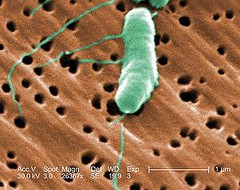 氣候變遷造成的海洋暖化,使得細菌更加擴散。根據推測,因為工作或娛樂接觸到受污染食物、飲水以及海洋性疾病的人,每年耗費數百萬美金的醫療資源。
氣候變遷造成的海洋暖化,使得細菌更加擴散。根據推測,因為工作或娛樂接觸到受污染食物、飲水以及海洋性疾病的人,每年耗費數百萬美金的醫療資源。
這項警告來自一群歐洲科學家在13日發表的一項報告。他們稍後在布魯塞爾舉行了為期兩天的會議,討論氣候變遷對海洋環境的影響。
這份200頁的報告,是「氣候變遷與歐洲海洋生態系統研究計畫」(CLAMER)的成果,由歐洲17個海洋研究機構所共同合作執行。其中包含了自1998年起超過100個歐盟資助的計畫以及民意調查結果、一本有科學根據的新書,以及一部CLAMER 14至15日於布魯塞爾會議中焦點的重要記錄片。
CLAMER的報告指出,「人類食用受感染的海產、攝入含有病原體的水源或者因從事海洋活動與海洋相關工作時接觸得到的海洋相關疾病,造成了數百萬歐元的醫療支出。氣候條件在這些疾病的傳播上扮演的角色越來越重要。」
一個成員來自義大利、英國、德國與美國的研究團隊發現,溫暖的海水造成了一種弧菌屬(Vibrio)的細菌擴散,這類的細菌是致病菌中最危險的一群,會造成嚴重的疾病,像是腸胃炎、敗血症以及霍亂。
部分細菌以及與微細藻類被認為與致死的貝類食物中毒有關。其他則危害著海洋動物,包括軟體動物以及魚類。研究人員表示,「這對經濟與環境造成很大的衝擊。」
這份報告中指出,「歐洲西北部地區,暖水性弧菌引發的沐浴感染史無前例的增加中,與這些病菌相關的疾病有整體性增加的趨勢。」
雖然這項研究取樣點是靠近歐洲的萊因河口以及英國的亨伯(Humber)河口,報告中警告,「增加的優勢海洋弧菌,包括致病菌種等,可能在全球其他地方發生類似的狀況。」「我們提供的證據顯示,包含霍亂弧菌等的弧菌,在過去44年來,隨著北海與浮游藻類相關的細菌群落的增加而轉為優勢種,而這個現象與同時期氣候造成的海水表面暖化有顯著的相關性......海洋暖化有利於弧菌的傳播。」
北大西洋中,伴隨著更高海浪的海平上升現象以及更嚴重的風暴,對歐洲離海岸500公尺以內地區的各項資產造成的威脅超過一兆歐元。歐洲有35%的GDP來自離海岸50公里內的地區,報告指出。
報告警告,「海平面上升80到200公分,可能使整個國家毀滅......、引發海水倒灌、大量的經濟損失、大批人口從水災區遷移、鹽鹼入侵,並喪失溼地生態系統以及其所提供的服務。」
這份報告中附帶的民意調查指出,人們主要擔心的問題是海平面上升以及海岸侵蝕。
受訪者表示,他們有採取個人的行動來減少二氧化碳排放量,並將氣候變遷問題歸咎於其他團體或國家。他們也將緩解問題的責任歸給政府與企業,即使他們認為政府與企業在處理這些議題上沒有效率。
一月以布魯塞爾為基礎所辦的TNS民調,是這類民調首次將重點放在公眾觀念對氣候變遷造成海洋或海岸的影響。
問卷要求選擇一個全球面臨最嚴重的問題,18%的受訪者選擇了氣候變遷,這是得票第二高的。相比之下,貧窮和缺乏食物與飲用水的得票率為31%,國際恐怖主義為16%,而全球經濟衰退則為12%。
雖然2010年北歐的冬天寒冷,加上氣候門事件(Climategate)對政府間氣候變化專門委員會(IPCC)與氣候學家的打擊,在歐盟2009年九月發起歐盟民調(Euro-Barometer)後對氣候變化的關注並未減少。
有86%的受訪者表示,氣候變遷完全、主要,或部分是由人類活動造成的。只有8%的受訪者表示這完全是自然因素所導致。在美國,則有32%-36%的人持這種觀點。
在大學或是為非政府環境組織工作的學者所提供有關氣候變遷對海洋影響的資訊,其受信賴的程度遠超過為政府與企業工作的科學家。
歐洲公民對海洋氣候變遷問題的個人行動展現在減緩氣候變遷上,例如減少能源的使用,並且使用永續的交通方式,然後透過像是保護家庭免於洪水的措施來適應這個問題。
Climate change is warming ocean waters, causing the spread of bacteria predicted to cost millions in health care as people are exposed to contaminated food and water and to marine diseases at work or at play.
The warning is expressed in a paper released today by European scientists in advance of a two-day conference in Brussels on the effects of climate change on the marine environment.
Project CLAMER, which stands for Climate Change and European Marine Ecosystem Research, a collaboration of 17 European marine institutes, issued the 200-page synthesis of more than 100 EU-funded projects published since 1998, together with a public opinion survey, a new book based on the scientific findings, and a major new documentary film to be featured at CLAMER's meeting September 14-15 in Brussels.
"Millions of euros in health costs may result from human consumption of contaminated seafood, ingestion of water-borne pathogens, and, to a lesser degree, through direct occupational or recreational exposure to marine diseases. Climatic conditions are playing an increasingly important role in the transmission of these diseases," says the CLAMER paper.
A team of researchers from Italy, the UK, Germany and the United States has found that warmer ocean water is causing a proliferation of bacteria from a genus known as Vibrio, among the most dangerous of all bacterial pathogens, which can produce serious illnesses such as gastroenteritis, septicemia and cholera.
Some types of the bacteria and micro-algae are linked to shellfish-associated food poisoning deaths. Others harm marine animals, including mollusks and fish, "with major economic and environmental impacts," the researchers say.
The paper reports "an unprecedented increase in the number of bathing infections that have been associated with warm-water Vibrio species in Northwest Europe," and a "globally-increasing trend in their associated diseases."
While the study was based on seawater samples taken near the mouth of Europe's Rhine River and Britain's Humber River, "the increasing dominance of marine Vibrios, including pathogenic bacterial species, may very likely occur in other areas around the world," the paper warns.
The authors write, "We provide evidence that Vibrios, including the cholera species, increased in dominance within the plankton-associated bacterial community of the North Sea during the past 44 years and that this increase is correlated significantly with climate induced sea surface warming during the same period. ... Ocean warming is favouring the spread of Vibrios."
Sea level rise, combined with higher waves in the North Atlantic and more frequent and severe storms, threaten up to one trillion euros worth of Europe's physical assets within 500 meters of the shore. And some 35 percent of Europe's GDP is generated within 50 kilometers of the shore, the synthesis notes.
"Sea-level rise of 80 to 200 cm could wipe out entire countries ... causing sea floods, massive economic damage, large movements of populations from inundated areas, salinity intrusion and loss of wetlands including the ecosystem services that they provide," the paper warns.
In the public opinion poll that accompanies the paper, worried citizens say their main concerns are sea level rise and coastal erosion.
While respondents said they are taking personal actions to reduce carbon emissions, they blame climate change on other groups of people or nations.
They assign responsibility for mitigating the problem to governments and industry, although they perceive government and industry as ineffective on these issues.
Conducted in January by Brussels-based TNS Opinion, the survey is the first of its kind to focus on public perceptions of climate change impacts at the coast or in the sea.
Asked to select from a list the single most serious problem facing the world, 18 percent of respondents chose climate change, the second highest choice.
By comparison, poverty and lack of food and drinking water was chosen by 31 percent, international terrorism by 16 percent, and a global economic downturn by 12 percent.
Concern about climate change is undiminished since a September 2009 Euro-Barometer survey conducted for the European Union, despite the cool winter of 2010 in Northern Europe and Climategate attacks on the Intergovernmental Panel on Climate Change and climate scientists.
Some 86 percent of respondents said climate change is caused entirely, mainly or in part by human activities. Only eight percent thought it is mainly or entirely caused by natural processes. In the United States, around 32-36 percent hold this view.
Scientists working in universities or for environmental NGOs are trusted as a source of information about climate change impacts in the seas and ocean far more than government scientists or those working for industry.
Personal actions taken by European citizens in response to marine climate change issues are shown to focus more on mitigating climate change, such as reducing energy use and using sustainable forms of transport, than adapting to its impacts, through protecting homes from flooding, for example.
※ 全文及圖片詳見:ENS


